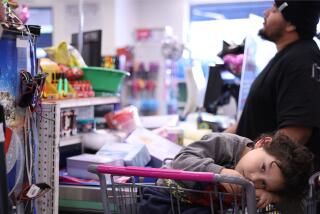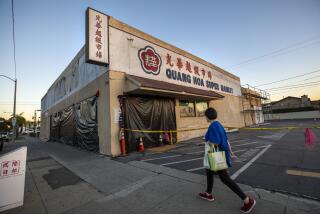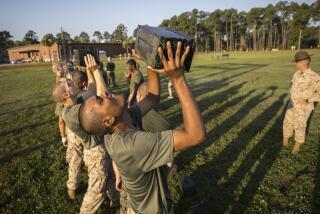Desert Dollars : Oceanside Merchants on a Roll as Troops Return Hot to Shop
- Share via
The big sleep is over for downtown Oceanside, where merchants with half-empty stores during the nine-month Persian Gulf crisis are welcoming back free-spending Marines with relief and, in some cases, rip-off schemes.
Young Marines from Camp Pendleton who socked away thousands of dollars in regular and hazardous duty pay during their deployment are on a consumer binge--buying cars, stereoes, jewelry, guns, uniforms and airplane tickets.
“When the war was over and the guys came back, holy hell broke loose,” said Jerry Alexander, the manager of Dorothy’s Military Shop. “April was my best month ever.”
But at the same time Marines are being genuinely welcomed home--many homes and stores are decked in American flags and yellow ribbons--some of the servicemen are getting fleeced by a minority of unscrupulous businesses.
“We’re seeing a strong increase in consumer-related problems where Marines, after they’ve signed a contract, see what they’ve gotten themselves into,” said 1st Lt. Pat Murphy, a military attorney at the base.
Although there have always been hassles with some businesses catering to the military, not just in Oceanside but countywide, abuses are escalating now that 21,000 Camp Pendleton Marines are back from the war.
“The problems are multiplying rapidly,” Murphy said. “Most businesses have really been helpful in welcoming the Marines back, but there’s always the 10%.”
Perhaps the most typical scheme is enticing a young Marine to buy an expensive item, such as furniture or jewelry for small monthly payments, but failing to reveal 20% interest payments on account balances. Some Marines will pay for years on their accounts.
“There’s a real question whether interest rates are being disclosed,” Murphy said. “What I’m starting to see now, there are deals targeted to military people.”
Murphy, who works with the Armed Forces Disciplinary Control Board that can put businesses off-limits for unethical practices, said inexperienced teen-age Marines are often easy prey.
“Some of these Marines are 18, 19 years old. They’re not so worried about looking at the (sales) contract as getting the merchandise,” Murphy said.
Beside shady contracts, Murphy said some Marines are the victims of hard-sell tactics to buy flashy but “grossly overpriced” items like jewelry or cameras.
Taking advantage of gullible young Marines is perhaps the only blemish on a joyous homecoming and economic recovery in a community that depends on military paychecks.
When the first big deployment of troops left last August, many downtown merchants almost immediately lost half or more of their trade. But after months of struggling, the business people are once again gratefully awash in Marines.
“I’m not going to call it a boom,” said David Hadsell, owner of American Travel Service, a long-time local business, “but things are back to normal.”
Hadsell had lost much of his Marine clientele to Desert Storm, fear of terrorism and the gloomy mood over the recession.
Then suddenly, about mid-March, large numbers of troops began returning to Camp Pendleton with a 30-day leave and hankering to fly home to visit families.
“These guys were coming in 20 at a time,” Hadsell said. “They were saying ‘half of us want to go to Des Moines and half of us want to go to Pittsburgh.’ ”
“It was phenomenal . . . it was like the old days,” Hadsell said.
At this rate, he expects it’ll take just another three months or so to make up for the economic loss during the deployment.
After all, the Marines who spent mostly tedious months on the sands of Saudi Arabia, where there was virtually nothing to buy or enjoy, have a little busting loose in mind. Many have the money to do it.
Cpl. Jody Bellesfield, 22, who was gone 10 months, has treated himself to a stereo and given his car a $1,200 new lease on life. He was standing in line at Dorothy’s Military Shop to get his dress blue uniform cleaned to wear at his wedding.
“The people are a lot nicer since we’ve been back,” he observed.
Elsewhere in the store, Lance Cpl. David Delgado, who was deployed for seven months, is shopping for colorful campaign ribbons he is now entitled to wear on his uniform.
“I’ve bought a lot of things,” he said cheerfully, pointing to a new watch. But, he qualified, “I’m married, most of my money went to bills.”
If the Marines aren’t already naturally inclined to spend their accumulated pay, businesses are happy to provide enticements.
One store selling instruments offers free music lessons, a developer is advertising a $5,000 discount to Persian Gulf veterans on selected new homes and airlines are giving a “welcome home fare” for military and dependents.
“The activity and the foot traffic downtown has picked up dramatically,” said Stebbins Dean, chief administrative officer of the Oceanside Chamber of Commerce.
Nine months ago, Billy Valli sat outside the Hill Street barber shop where he worked, sipping a soda and watching the woefully few pedestrians pace by. Business was off by more than one third.
Last week was different, and Valli, a long-haired barber in a short-haired town, said: “For the most part, it’s back to normal, just as I was starting to look for another job.”
“It’s getting to where it’s like nothing happened,” he said. But he noted one change in his customers who have returned from the war. “A lot of ‘em seem more grown,” he said.
Other merchants are thankful the economic nightmare is over.
Down the street at Stephen’s gun shop, John Rippo recalled that during the deployment “we were 50% down, easy.” Now, the servicemen are filtering back in and business is up to about 75%.
“Here these young guys, all they’d been reading is gun books over there,” Rippo said. But for single Marines with more disposable income, firearms aren’t their highest priority, he said. Cars are.
Banks and credit unions report a heavy volume of applications for car loans, all of which makes Mits Akutagawa, the vice president and general manager of Surfside Nissan, a relieved and happy man.
Thirty percent of his customers are Marines, and in the grim month of January, only one Marine bought a vehicle. The number rose to 14 in March, when the troops began arriving, and hit 24 in April.
“If they don’t have dependents, everybody wants a car,” Akutagawa said. His military business is back up to 90%, and a full recovery is expected.
It’s hardly surprising that troops freshly returned from war would treat themselves to a spending spree, and the Marine Corps West Federal Credit Union was prepared.
Lou deCarlo, the credit union president, said “we see a high volume of transactions,” mostly consumer loans to buy cars, televisions, refrigerators and airplane tickets. However, many Marines aren’t qualifying for the loans because of poor credit records or high debts.
Savings accounts for Marines between ages 18 and 30 are drawn down $1.5 million, “twice the number we’d normally have,” he said.
There’s considerable evidence that plenty of Marines saved their money and are able to make expensive purchases.
At the Bank of America branch downtown, where 28% of the clientele is military, branch manager James Roby is watching the spurt of activity as droves of Marines apply for credit cards and loans.
“A lot in the past, many Marines wanted to buy the car with no cash down,” Roby said. But lately, he’s seeing them fork over 20% down-payments and thus receiving a lower fixed-rate loan.
Despite the return to better times, not everybody’s sure their business will survive.
One large retailer of big-ticket items, who asked that neither his name nor type of merchandise be mentioned, is seriously worried about creditors. He said his business dropped 60% during the deployment, and he’s only gained half that back. The problem now is many of the Marines who returned quickly left on 30-day leave, he said.
Curiously, some merchants actually did more business during the deployment and volume has leveled off since the troops returned.
Debbie Cathey owns H&M; Military Supplies, a corner store offering everything from uniform insignia to knives, flags and souvenirs. When the Marines departed, she started a brisk civilian trade for patriotic items.
“For every Marine (who left), you figure you were getting his girlfriend or his wife” shopping at the store. Many spouses sent boots and other gear to the deployed Marines.
“We got mail orders from all over the country” for such items as bracelets engraved with Operation Desert Storm. Her store was shown on CNN and on San Diego and Los Angeles television stations.
“We got enough news coverage, we almost didn’t have to advertise,” Cathey said. But now the civilian trade has dwindled and the boom has eased into normalcy.
Yet the obvious glee that business is back doesn’t mask other sentiments among retailers.
Taped up in the display window of one store is a newspaper clipping with pictures of the first Camp Pendleton Marines killed in the war. Above it is a plain hand-lettered sign, “Gone But Not Forgotten.”


